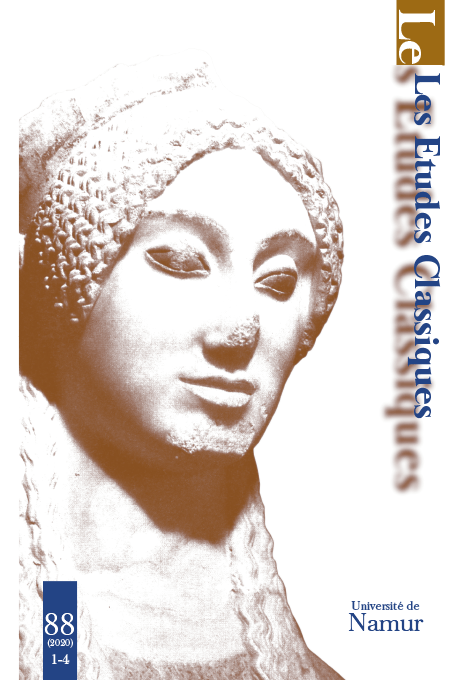 previous article in this issue previous article in this issue | next article in this issue  |

Preview first page |
Document Details : Title: Un verso di Orazio nel De monade di Giordano Bruno Subtitle: Per una storia di un'espressione proverbiale (Est aliquid prodisse tenus) e di un tema (l'audacia nel cimentarsi in imprese difficili) Author(s): ORDINE, Nuccio Journal: Les Études Classiques Volume: 89 Issue: 1-4 Date: 2021 Pages: 199-249 DOI: 10.2143/LEC.89.1.3290427 Abstract : In the Cena and the Furori we find a recurring theme in Brunian thought: the attitude to be adopted in a difficult undertaking, in which it is more honourable to partake in the contest than to obtain victory. In De monade (1591), within a broad reflection dedicated to the 'glorious defeat', Bruno inserts the first hemistich of a verse of Horace’s first Epistle (I, 1, 32). However, this borrowing, which has so far gone unnoticed, transforms the adverb and the verb tense of the original: the phrase 'Est quadam prodire tenus' of the Latin poet becomes in the philosopher’s poem 'Est aliquid prodisse tenus'. So, in search of the Nolan’s possible sources, I made a journey à rebours that allowed me to relate the Brunian quote to a commentary by Wolfgang Musculus on the Letter to the Ephesians of Saint Paul and to a topos of Latin elegy (the theme of recusatio) which, starting with Propertius and passing through Pico della Mirandola and Poliziano, finally reaches Erasmus of Rotterdam. A journey that allowed me to better understand Bruno’s thought (and the extraordinary network of relationships woven by the philosopher throughout Europe) as well as to retrace the partial success of the Horatian verse (which later became gnomic to the point of being used even as a motto associated with an image) in Renaissance authors and texts that have no obvious connection to each other. Dans Cena et Furori, on trouve un thème récurrent dans la pensée brunienne: l’attitude à adopter dans une entreprise difficile où la dignité de la course vaut davantage que la conquête de la victoire. Dans le De monade (1591), au sein d’une large réflexion consacrée à la «glorieuse défaite», Bruno insère le premier hémistiche d’un vers de la première épître d’Horace (I, 1, 32). Il s’agit d’une reprise, jusqu’ici passée inaperçue, caractérisée par deux variantes concernantun adverbe et le temps d’un verbe: l’expression du poète latin «Est quadam prodire tenus» devient dans le poème du philosophe «Est aliquid prodisse tenus». C’est ainsi que, parti à la recherche des sources possibles du Nolain, j’ai effectué un voyage à rebours qui m’a permis de rapprocher la citation brunienne d’un commentaire de la Lettre aux Éphésiens de saint Paul écrit par Wolfgang Musculus et d’un topos de l’élégie latine (le thème de la recusatio) qui, de Properce en passant par le Pic de la Mirandole et Ange Politien, aboutit à Érasme de Rotterdam. Un voyage qui m’a permis de mieux comprendre la pensée de Bruno (et l’extraordinaire réseau de relations tissé par le philosophe en Europe) et de reconstituer la relative fortune du vers d’Horace (qui est devenu par la suite gnomique au point d’être utilisé même comme devise associée à une image) chez des auteurs et des textes de la Renaissance que l’on n’a pas spontanément l’idée de rapprocher les uns des autres. |
|


